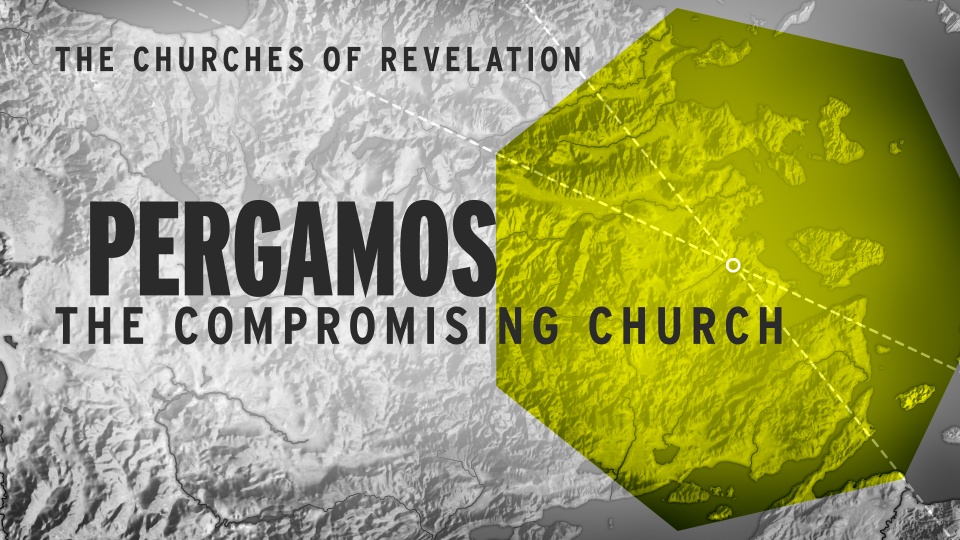Related:
To the Church in Ephesus To the Church in Smyrna

"...He that has ears, let him hear what the Spirit says to the Churches" ~ Rev. 2:17
Revelation 2 begins a series of brief letters to seven churches that existed during the apostle John’s time in Asia Minor (modern-day Turkey). Each of these messages includes information apropos to each church, and from these messages we can draw lessons applicable to our own lives today.
Revelation 2:12-17 continues with the third of seven messages to the churches of Asia Minor (modern-day Turkey) during the apostle John’s time. Each of these messages includes a specific word to a specific church, but there are also lessons applicable to the lives of believers today. This third letter is to the believers in Pergamum (or Pergamos), which was a beautiful and art-filled city in the province of Asia built along two tributaries of the Caicus River. Pergamum was a center for the worship of Dionysus, Zeus, and other pagan gods.The message to the Pergamene church was from the Lord Jesus Christ, specifically addressed to the “angel” (or “messenger”) of the church: “And to the angel of the church in Pergamum write: ‘These are the words of him who has the sharp, double-edged sword’” (Revelation 2:12). This was not John’s message to the believers at Pergamum; it was a message from Jesus Christ. The depiction of Jesus holding a sharp, two-edged sword refers to the Lord’s readiness to bring judgment (cf. Revelation 1:16).
First, Jesus affirms the church’s positive actions:
“I know where you live—where Satan has his throne. Yet you remain true to my name. You did not renounce your faith in me, even in the days of Antipas, my faithful witness, who was put to death in your city—where Satan lives” (Revelation 2:13).
The Pergamene believers lived in a difficult place, surrounded by pagan influences, yet they held fast to Christ’s name and did not deny Him during difficult times.
One Christian in Pergamum named Antipas is mentioned as a “faithful witness.” Church tradition says that Antipas was a physician suspected of secretly propagating Christianity. The Aesculapians (members of the medical guild) accused Antipas of disloyalty to Caesar. Upon being condemned to death, Antipas was placed inside a copper bull, which was then heated over a fire until it was red-hot.
The church was not perfect, however, and Jesus took note of their sin:
“Nevertheless, I have a few things against you: You have people there who hold to the teaching of Balaam, who taught Balak to entice the Israelites to sin by eating food sacrificed to idols and by committing sexual immorality. Likewise you also have those who hold to the teaching of the Nicolaitans” (Revelation 2:14-15).
The “teaching of Balaam” is explained in the context, as Christians were eating food that had been sacrificed to idols (religious compromise) and committing sexual immorality (moral compromise). The original Balaam’s deceitful work is described in Numbers 25:1-3 and Numbers 31:15-16. The Nicolaitans are mentioned only in this letter and in the letter to the Ephesian church (Revelation 2:6). They were likely a group similar to those who held the teachings of Balaam, though the exact nature of their doctrine and practice is unknown.
Jesus then issues a clarion call to repent of their sin: “Repent therefore!” (Revelation 2:16). Our Lord hates religious and moral compromise. He calls His people to live differently.
Jesus notes the judgment that would take place if the church of Pergamum did not repent: “I will soon come to you and will fight against them with the sword of my mouth” (Revelation 2:16b). The Nicolaitans and those who were teaching Balaam’s error would be destroyed, along with their followers, from the congregation at Pergamum. Jesus desires purity among His people, and we have a responsibility to remove false teachers from the church.
Jesus makes a final promise to the believers in Pergamum: “To him who overcomes, I will give some of the hidden manna. I will also give him a white stone with a new name written on it, known only to him who receives it” (Revelation 2:17). The three blessings are hidden manna, a white stone, and a new name. The precise explanation of these three items is disputed; however, all three blessings must concern the believer’s victorious reign with Christ, consistent with the blessings bestowed on the other six churches of Revelation 2–3. The “hidden manna” is likely an allusion to the manna hidden in the Ark of the Covenant, representative of God’s faithful presence and sustenance. The “white stone” could be a reference to the stones used for entrance into temple events in ancient times or to one of the stones on the high priest’s breastplate (Exodus 28:21), although the exact meaning of the stone is uncertain.

No comments:
Post a Comment